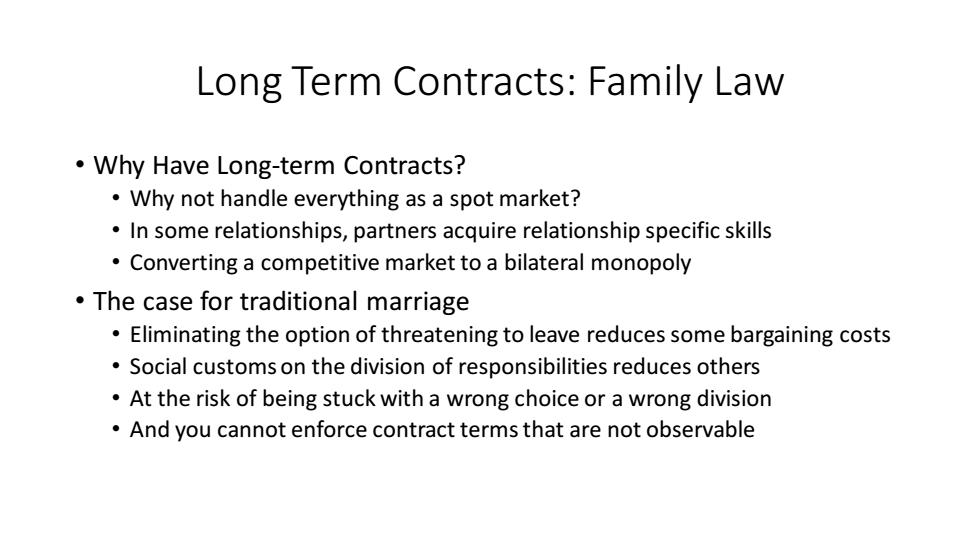
Long Term Contracts:Family Law Why Have Long-term Contracts? Why not handle everything as a spot market? In some relationships,partners acquire relationship specific skills Converting a competitive market to a bilateral monopoly The case for traditional marriage Eliminating the option of threatening to leave reduces some bargaining costs Social customs on the division of responsibilities reduces others At the risk of being stuck with a wrong choice or a wrong division And you cannot enforce contract terms that are not observable
Long Term Contracts: Family Law • Why Have Long-term Contracts? • Why not handle everything as a spot market? • In some relationships, partners acquire relationship specific skills • Converting a competitive market to a bilateral monopoly • The case for traditional marriage • Eliminating the option of threatening to leave reduces some bargaining costs • Social customs on the division of responsibilities reduces others • At the risk of being stuck with a wrong choice or a wrong division • And you cannot enforce contract terms that are not observable
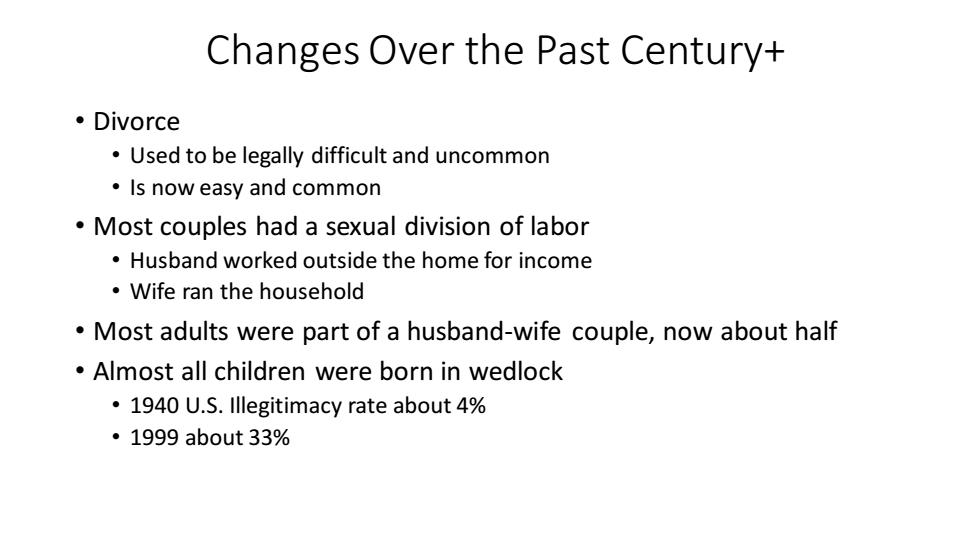
Changes Over the Past Century+ 。Divorce Used to be legally difficult and uncommon ·Is now easy and common Most couples had a sexual division of labor Husband worked outside the home for income Wife ran the household Most adults were part of a husband-wife couple,now about half Almost all children were born in wedlock 1940 U.S.Illegitimacy rate about 4% ·1999ab0ut33%
Changes Over the Past Century+ • Divorce • Used to be legally difficult and uncommon • Is now easy and common • Most couples had a sexual division of labor • Husband worked outside the home for income • Wife ran the household • Most adults were part of a husband-wife couple, now about half • Almost all children were born in wedlock • 1940 U.S. Illegitimacy rate about 4% • 1999 about 33%

Why did these changes happen? Housewife ceased to be a full time job because Infant mortality rates dropped A lot of household production moved out of the house Since women were less specialized to being the wife of a particular man The costs of ending a marriage,while still substantial,were smaller So less incentive to make and keep long term contracts
Why did these changes happen? • Housewife ceased to be a full time job because • Infant mortality rates dropped • A lot of household production moved out of the house • Since women were less specialized to being the wife of a particular man • The costs of ending a marriage, while still substantial, were smaller • So less incentive to make and keep long term contracts
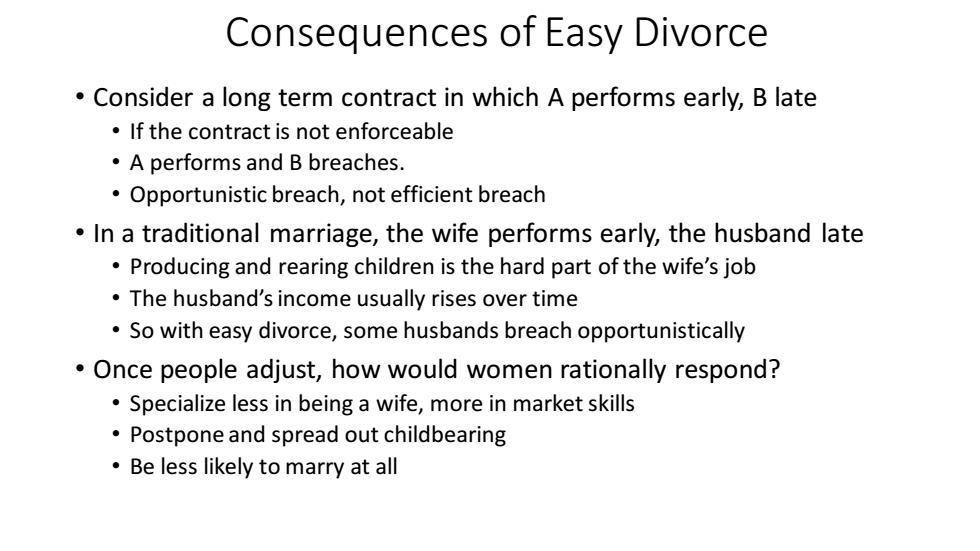
Consequences of Easy Divorce Consider a long term contract in which A performs early,B late If the contract is not enforceable A performs and B breaches. Opportunistic breach,not efficient breach In a traditional marriage,the wife performs early,the husband late Producing and rearing children is the hard part of the wife's job The husband's income usually rises over time So with easy divorce,some husbands breach opportunistically Once people adjust,how would women rationally respond? Specialize less in being a wife,more in market skills Postpone and spread out childbearing Be less likely to marry at all
Consequences of Easy Divorce • Consider a long term contract in which A performs early, B late • If the contract is not enforceable • A performs and B breaches. • Opportunistic breach, not efficient breach • In a traditional marriage, the wife performs early, the husband late • Producing and rearing children is the hard part of the wife’s job • The husband’s income usually rises over time • So with easy divorce, some husbands breach opportunistically • Once people adjust, how would women rationally respond? • Specialize less in being a wife, more in market skills • Postpone and spread out childbearing • Be less likely to marry at all
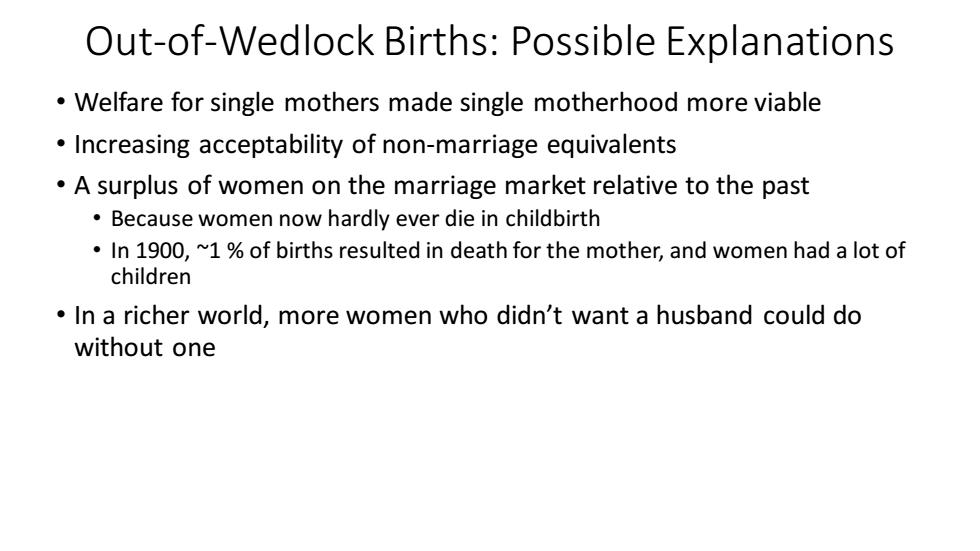
Out-of-Wedlock Births:Possible Explanations Welfare for single mothers made single motherhood more viable Increasing acceptability of non-marriage equivalents A surplus of women on the marriage market relative to the past Because women now hardly ever die in childbirth In 1900,~1 of births resulted in death for the mother,and women had a lot of children In a richer world,more women who didn't want a husband could do without one
Out-of-Wedlock Births: Possible Explanations • Welfare for single mothers made single motherhood more viable • Increasing acceptability of non-marriage equivalents • A surplus of women on the marriage market relative to the past • Because women now hardly ever die in childbirth • In 1900, ~1 % of births resulted in death for the mother, and women had a lot of children • In a richer world, more women who didn’t want a husband could do without one
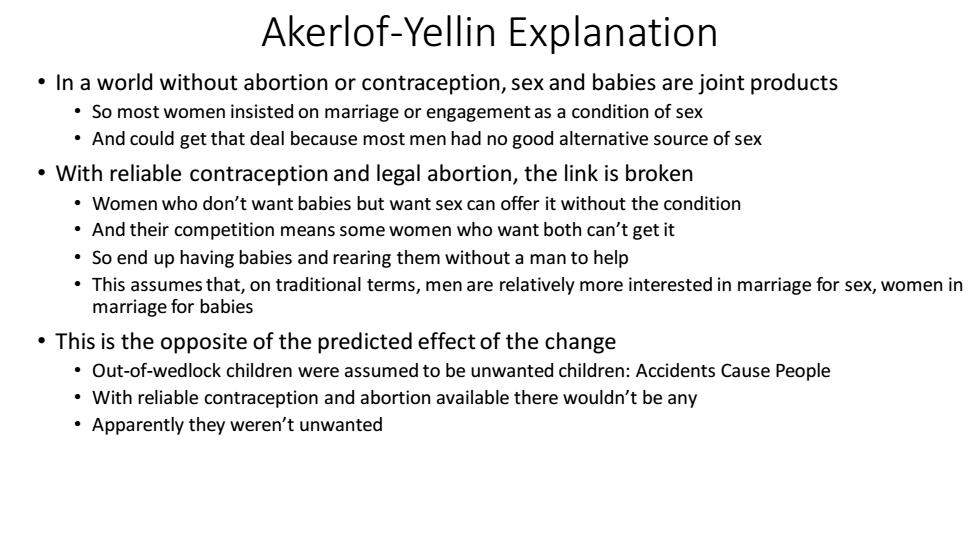
Akerlof-Yellin Explanation In a world without abortion or contraception,sex and babies are joint products So most women insisted on marriage or engagement as a condition of sex And could get that deal because most men had no good alternative source of sex With reliable contraception and legal abortion,the link is broken Women who don't want babies but want sex can offer it without the condition And their competition means some women who want both can't get it So end up having babies and rearing them without a man to help This assumes that,on traditional terms,men are relatively more interested in marriage for sex,women in marriage for babies This is the opposite of the predicted effect of the change Out-of-wedlock children were assumed to be unwanted children:Accidents Cause People With reliable contraception and abortion available there wouldn't be any Apparently they weren't unwanted
Akerlof-Yellin Explanation • In a world without abortion or contraception, sex and babies are joint products • So most women insisted on marriage or engagement as a condition of sex • And could get that deal because most men had no good alternative source of sex • With reliable contraception and legal abortion, the link is broken • Women who don’t want babies but want sex can offer it without the condition • And their competition means some women who want both can’t get it • So end up having babies and rearing them without a man to help • This assumes that, on traditional terms, men are relatively more interested in marriage for sex, women in marriage for babies • This is the opposite of the predicted effect of the change • Out-of-wedlock children were assumed to be unwanted children: Accidents Cause People • With reliable contraception and abortion available there wouldn’t be any • Apparently they weren’t unwanted

Explaining Sex Law Against adultery:Contract enforcement Especially against female adultery-the double standard Men don't get pregnant,and men want to rear their own children Male adultery can divert resources away from the wife For both,a link between sexual exclusiveness and emotional commitment 。Against fornication Akerlof-Yellin argument:Women who want to get married don't want competition If marriage produces better children,and fornication undermines marriage That's an argument for discouraging fornication
Explaining Sex Law • Against adultery: Contract enforcement • Especially against female adultery—the double standard • Men don’t get pregnant, and men want to rear their own children • Male adultery can divert resources away from the wife • For both, a link between sexual exclusiveness and emotional commitment • Against fornication • Akerlof-Yellin argument: Women who want to get married don’t want competition • If marriage produces better children, and fornication undermines marriage • That’s an argument for discouraging fornication

Rings and Promises:Margaret Brinig Traditional pattern included sex before marriage but with commitment That raises the risk of seduce and abandon In Anglo-American law,breach of promise was actionable In effect damages for loss of virginity,which was valuable on the marriage market ·Why? Starting about 1935,U.S.courts increasingly abandoned the action Which is why women started requiring valuable engagement rings Think of it as a performance bond-if he jilts her she keeps the ring
Rings and Promises: Margaret Brinig • Traditional pattern included sex before marriage but with commitment • That raises the risk of seduce and abandon • In Anglo-American law, breach of promise was actionable • In effect damages for loss of virginity, which was valuable on the marriage market • Why? • Starting about 1935, U.S. courts increasingly abandoned the action • Which is why women started requiring valuable engagement rings • Think of it as a performance bond–if he jilts her she keeps the ring

Seduction Law:Old and Older Fathers want to control who their daughters'marry In Anglo-American common law,one way of doing it Was an action against a seducer by the father On the grounds that he was deprived of the services of a servant My explanation:"Seduction"often meant evasion of parental control If Bill gets me pregnant my father will have to let us get married So the father wants a legal action he can control,not one his daughter can control The same issue shows up in traditional Jewish law Under religious law,a woman was adult and could choose her husband at 12 Communal authorities tried to find ways of adding additional requirements Getting around the religious law rules in various ways Pretty clearly for the same reason
Seduction Law: Old and Older • Fathers want to control who their daughters’ marry • In Anglo-American common law, one way of doing it • Was an action against a seducer by the father • On the grounds that he was deprived of the services of a servant • My explanation: “Seduction” often meant evasion of parental control • If Bill gets me pregnant my father will have to let us get married • So the father wants a legal action he can control, not one his daughter can control • The same issue shows up in traditional Jewish law • Under religious law, a woman was adult and could choose her husband at 12 ½ • Communal authorities tried to find ways of adding additional requirements • Getting around the religious law rules in various ways • Pretty clearly for the same reason
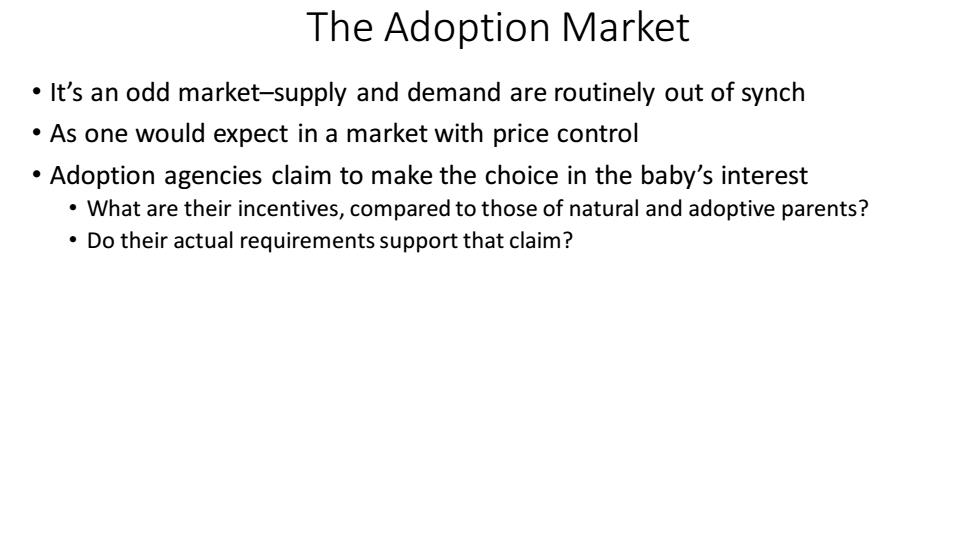
The Adoption Market It's an odd market-supply and demand are routinely out of synch As one would expect in a market with price control Adoption agencies claim to make the choice in the baby's interest What are their incentives,compared to those of natural and adoptive parents? Do their actual requirements support that claim?
The Adoption Market • It’s an odd market–supply and demand are routinely out of synch • As one would expect in a market with price control • Adoption agencies claim to make the choice in the baby’s interest • What are their incentives, compared to those of natural and adoptive parents? • Do their actual requirements support that claim?